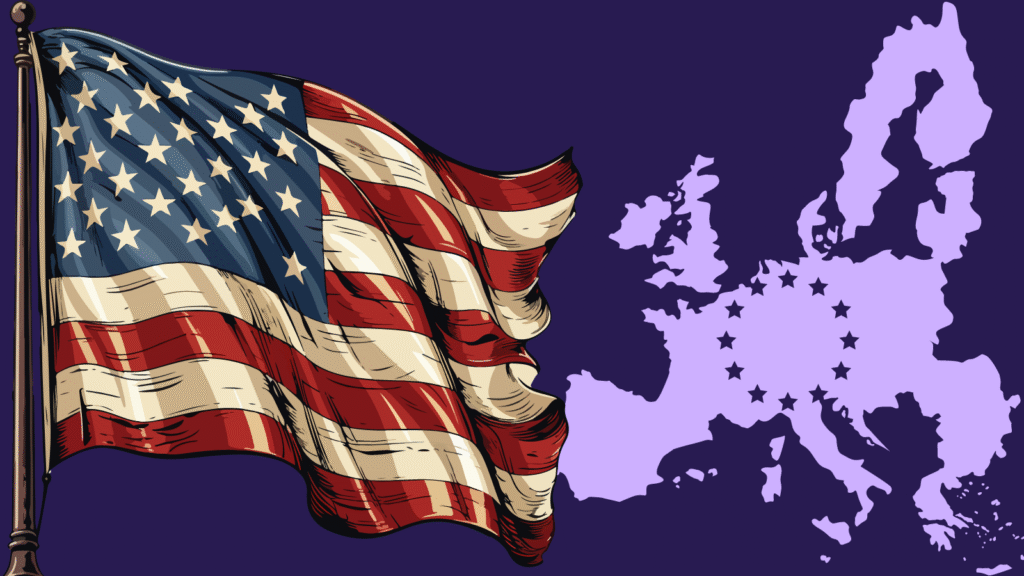Expanding into European markets is an enticing opportunity for U.S. tech and software companies seeking growth. With a population of over 740 million and a combined GDP surpassing $15 trillion, Europe offers significant potential. However, this potential comes with a complex landscape of diverse languages, cultures, regulatory frameworks, and market conditions.
To succeed, U.S. companies must navigate these challenges with strategic planning, local insights, and targeted marketing efforts. This article will explore how U.S. tech and software companies can effectively establish and grow their presence in Europe, supported by a comprehensive SWOT analysis.
Challenges of Operating in Europe
Expanding into Europe is not without its challenges. These challenges include, but are not limited to, the diversity of languages, cultures, regulatory environments, and the need for locally sourced talent. Each of these elements can significantly impact a company’s ability to operate effectively and compete with local players.
Language and Cultural Diversity
Europe is not a monolithic market. It comprises 44 countries, each with its own language, cultural norms, and business practices. Unlike the relatively homogenous U.S. market, where English is the primary language of business, European markets require a multilingual approach. This diversity means that marketing messages, product offerings, and customer service must be tailored to resonate with local audiences. For example, what works in Germany might not work in Spain due to differences in consumer behavior and cultural expectations.
Regional Regulations and Compliance
Compliance with European regulations is another critical challenge. The European Union (EU) has strict regulations, particularly in data protection and privacy, such as the General Data Protection Regulation (GDPR). These regulations often differ from U.S. standards, and non-compliance can result in hefty fines and reputational damage. Additionally, different countries within Europe may have their own additional regulations, further complicating the compliance landscape.
Recruiting Local Talent
Hiring the right talent is crucial for successful market entry and growth. However, recruiting in Europe can be challenging due to differences in labor laws, recruitment practices, and cultural expectations. U.S. companies need to understand these differences to attract and retain top talent. For instance, employee benefits, work-life balance expectations, and even the role of unions can vary significantly from what U.S. companies are accustomed to.
SWOT Analysis for U.S. Tech Companies Entering Europe
To better understand the strategic landscape, here is a SWOT analysis specifically tailored for U.S. tech companies aiming to expand into Europe.
Strengths
• Established Brand Reputation: Many U.S. tech companies have strong global brands that are recognized and trusted in Europe.
• Advanced Technology: U.S. companies often lead in innovation, offering cutting-edge technology that can give them a competitive advantage in Europe.
• Financial Resources: Large U.S. firms typically have the financial muscle to invest in new markets, whether through acquisitions, partnerships, or direct investments.
Weaknesses
• Lack of Local Market Knowledge: U.S. companies may struggle with understanding the intricacies of different European markets, leading to misaligned strategies.
• Regulatory Compliance: Navigating the complex regulatory environment of the EU and individual countries can be daunting.
• Cultural Misalignment: A one-size-fits-all approach to marketing and operations can result in a disconnect with local consumers and employees.
Opportunities
• Expanding Digital Economy: Europe’s digital economy is growing rapidly, providing opportunities for tech companies to offer innovative solutions.
• Demand for Cloud and SaaS Solutions: European businesses are increasingly adopting cloud services and Software as a Service (SaaS) models, areas where U.S. companies excel.
• Potential for Strategic Partnerships: Collaborating with local firms can provide market insights, customer access, and operational support.
Threats
• Intense Competition: European markets are highly competitive, with strong local players and other international entrants vying for market share.
• Political and Economic Instability: Factors such as Brexit and varying economic conditions across countries can pose risks.
• Cybersecurity and Data Privacy Concerns: High expectations around data security and privacy in Europe can challenge U.S. companies used to different standards.
The Importance of Brand Positioning and Marketing
Successful expansion into Europe requires more than just understanding the market—it requires a strategic approach to brand positioning and marketing. Here are the key components to focus on:
Localization of Marketing Strategy
Localization goes beyond translation; it involves adapting the entire marketing strategy to meet the needs of each local market. This includes adjusting product offerings, marketing messages, and even customer service to align with local preferences. For example, payment methods popular in one country might not be as widely used in another.
Building Trust and Credibility
European consumers tend to be more skeptical than their U.S. counterparts, particularly in the tech sector. Building trust and credibility is essential, which can be achieved through local partnerships, compliance with local regulations, and a consistent, reliable product or service offering.
Digital Marketing and Online Presence
Europe has a highly digital consumer base, and a strong online presence is critical. This means investing in localized websites, search engine optimization (SEO), and
Next Steps
Expanding into Europe offers immense growth potential for U.S. tech and software companies. However, success requires a thorough understanding of the diverse European market landscape, compliance with complex regulations, and the ability to connect with local audiences. By conducting a comprehensive SWOT analysis, companies can identify their strengths, mitigate potential weaknesses, capitalize on opportunities, and navigate threats.
1. Market Research: Conduct detailed market research to understand the specific needs and preferences of target European markets.
2. Compliance Assessment: Evaluate and ensure compliance with all relevant European regulations, particularly GDPR.
3. Localization: Develop a localization strategy that includes language translation, culturally relevant marketing materials, and localized product features.
4. Talent Acquisition: Focus on recruiting local talent to build a strong European team that understands the market dynamics.
5. Partnerships: Identify potential local partners to facilitate market entry and growth.
6. Consultancy Engagement: Consider partnering with a marketing management consultancy like Digital Clarity to gain expert insights and support in executing your European market strategy.
By following these steps, U.S. tech companies can position themselves for long-term success in the dynamic and diverse European market.
Working with a Strategic Marketing Partner
Partnering with an experienced marketing management consultancy like Digital Clarity can provide a competitive edge. With a deep understanding of European markets, Digital Clarity can help U.S. companies develop and execute marketing strategies that resonate with local audiences. Their expertise in digital marketing, brand positioning, and customer acquisition ensures that U.S. companies can effectively capture market share and drive growth in Europe.
The importance of strategic brand positioning and marketing cannot be overstated. Partnering with a consultancy like Digital Clarity can be the key to unlocking success in Europe. Their local expertise and tailored marketing strategies will help U.S. tech companies not only enter but thrive in the European market.
To learn more: contact: reggie.james@



